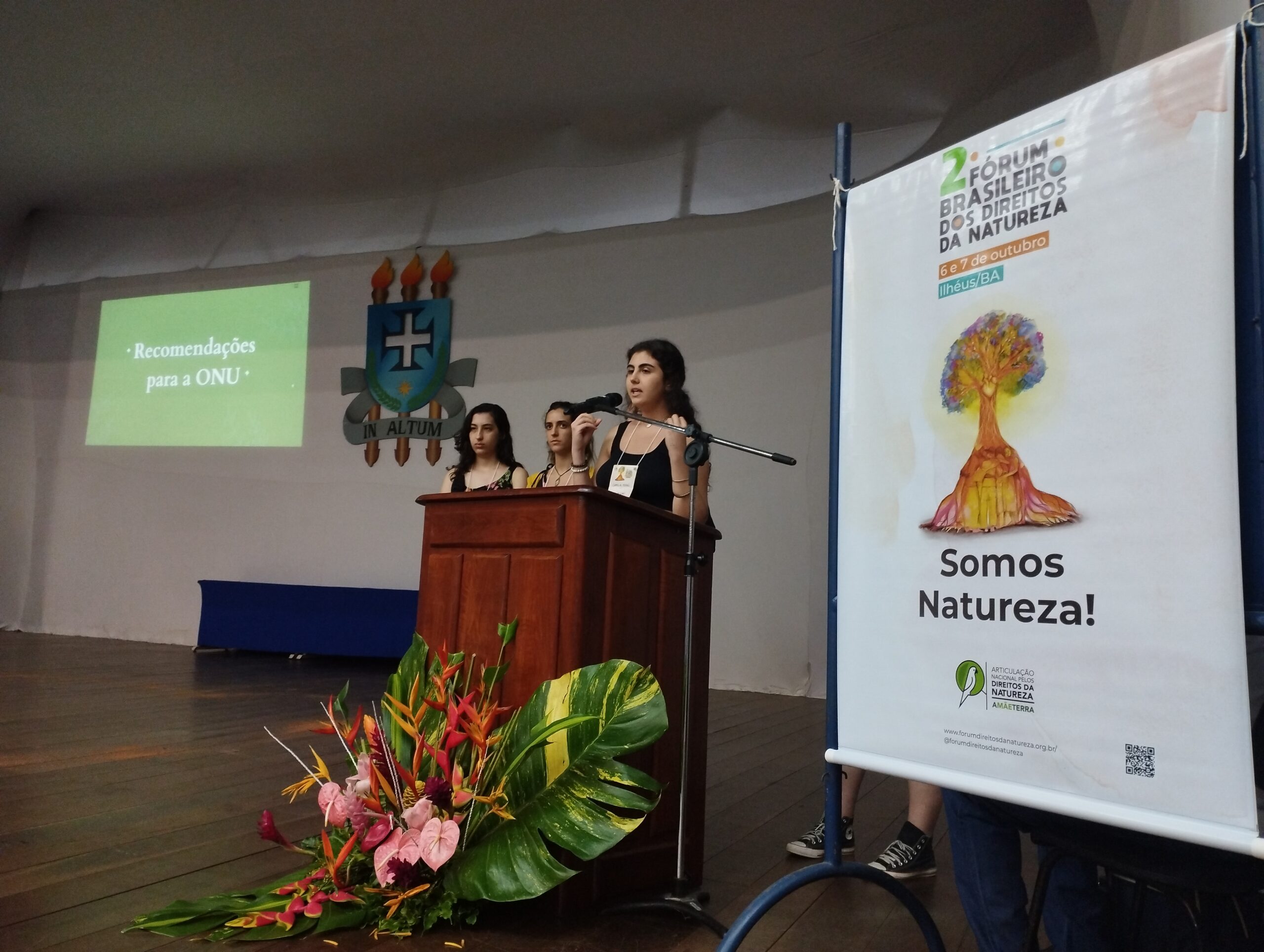by Flavio Montiel, International Rivers’ Brazil Manager
Last month, I had the opportunity to participate in the second Brazilian Rights of Nature Forum held in Ilhéus, Brazil. The forum served as a gathering point for more than 300 people from diverse biomes of Brazil. The event brought together environmentalists, legal scholars, Indigenous leaders, original populations, and activists.
Held in Aldeia Tukum, Tupinambás’ Indigenous territory, and Universidade Estadual de Santa Cruz (UESC), the forum promoted concrete actions such as practices of well-being, and collaboration to create proposals for laws recognizing the Rights of Nature at local and State levels, and territories. Outcomes of the forum pursuing the inclusion of the Rights of Natureza in the federal constitution and presenting the Declaration of the Rights of Nature and Mother Earth at COP 30 in Brazil. Additionally, the results of this forum with contribute to creating the United Nations’s (UN) Universal Declaration of Mother Earth which will be launched in April 2024.
Click here to see the photo gallery of the event
According to Vanessa Hasson, one of the organizers of the forum, the Rights of Nature movement was officially established in Brazil in 2015, when the civil society organization MAPAS, started to contribute to the United Nations Harmony with Nature program, which culminated in the publication of the first work on the subject in Brazil called the “Charter of Nature”.
In 2017, the Charter of Nature was signed during a side event of the Forum promoted by (Associação Nacional de Municípios e Meio Ambiente) ANAMMA coordinated by MAPAS, which promoted the promulgation of the first Brazilian law recognizing the rights of Nature, in the municipality of Bonito-PE (2018). It was then that the movement in Brazil began to take shape and expressed the desire to hold the 1st Brazilian Forum Rights of Mother Earth, which happened in Sao Paulo.
As a result of the movement’s first waves of abundance, the rights of Nature were recognized in the municipalities of Bonito, Paudalho, Florianópolis, and Serro, and state proposals were articulated in the states of Pará, Minas Gerais, and Santa Catarina.
Moving within the heart of Brazil’s breathtaking landscapes, rivers flow as witnesses to the ecological wonders that flourish within their depths and floodplains. Often overlooked amidst the clamor of urban development and economic pursuits, these majestic waterways have been the lifeblood of a nation, nurturing its ecosystems and cultures for millennia. As our planet faces ever-increasing environmental challenges, a groundbreaking movement is emerging to safeguard these vital watercourses and the ecosystems they support—the Rights of Nature movement.
In Brazil, rivers have historically been treated as sewage channels and their waters have been seen only as a natural resource to be exploited. The Water Law (9433/97), first passed in 1977, attributes only economic value to water, forgetting that a river’s water also has ecological, social, cultural, and spiritual value. Today in Brazil, there are more than 100 thousand kilometers of polluted and contaminated rivers, which represent 16% of all rivers in the country. There are also three large hydroelectric plants in the environmental licensing process and more than 156 small hydroelectric plants in different stages of implementation. This will have major socio-environmental impacts if they are built. Freshwater ecosystems are the most vulnerable to climate change and if we continue at the same pace, the near future will be disastrous. We need to gather strength to reverse this situation.
International Rivers and Rights of Nature movement
In 2011, with the support of International Rivers in partnership with the Xingu Vivo para Semper Movement, the first public civil action was presented to the federal Public Ministry (Ministério Público da União) as one of the arguments to suspend environmental licensing and the construction of the Belo Monte Hydroelectric Plant. Although we did not win this civil action, it served as a reference for other legal initiatives that followed such as the prohibition of building dams on the Cabaçal River in the Upper Paraguay basin.
Next steps for gaining Rights of Nature in Brazil
This second Brazilian Forum for the Rights of Nature brought together many civil society organizations who are expanding our movement and building new networks for dialogue to help the National Congress approve the constitutional amendment project to insert the Rights of Nature into the Brazilian Constitution. Additionally, we need to progress a specific law for the permanent protection of rivers. Our bill proposal for this protection was discussed in some working groups of this II Forum and recognized as necessary for greater legal protection of Brazilian rivers.
The defense of the Rights of Nature goes hand in hand with the proposed Permanent Protection of Rivers Bill. This year is favorable with high support to present the Bill in the National Congress. We invite social movement organizations to get involved in the fight. Rios need our protection!

